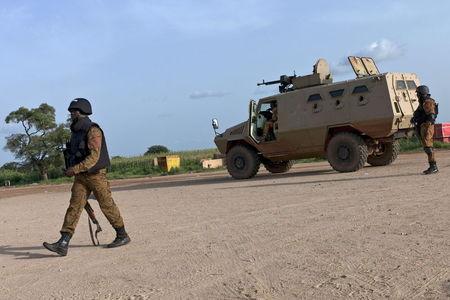Advertisement
Burkina army enters presidential guard camp, coup leader gone
OUAGADOUGOU (Reuters) - Burkina Faso soldiers met little resistance on Tuesday as they entered a presidential guard camp in the capital where members of the elite unit were holding out after a coup, an army officer said.
Residents of the Ouaga 2000 district in the capital Ouagadougou said they heard bursts of gunfire in the late afternoon as troops, who had surrounded the base for most of the day, moved in.
However, the officer, who was in command of part of the operation, said General Gilbert Diendere, the leader of the short-lived coup, was not in the camp.
"The armored vehicles entered the camp without much resistance. But he wasn't there. We don't totally control the camp, but we're carrying out clean-up operations," said the officer, who asked not to be named.
He said Diendere's vehicle had been destroyed by soldiers near the Vatican's diplomatic compound, and the general was believed to have sought refuge inside.
"I'm in a safe place. I'm not in the camp," Diendere told Reuters by telephone, declining to give further details of his whereabouts.
An army spokesman said earlier in the day that about 300 of the presidential guard's estimated 1,200 soldiers had surrendered at a second camp in the capital. Regular army troops had taken control of strategic locations previously occupied by the renegades, he said.
The Presidential Security Regiment (RSP) took the president, prime minister and several cabinet members hostage on Sept. 16 and named Diendere, former right-hand man of ousted president Blaise Compaore, as leader of the subsequent junta.
The coup lasted a week and the government was restored last Wednesday, formally disbanding the presidential guard during its first post-coup cabinet meeting. Regular troops began disarming the RSP over the weekend.
The army's chief of staff said on Monday, however, that some RSP officers were refusing to participate in the process and accused Diendere of hindering the disarmament and of seeking support from foreign forces and Islamist militants.
Speaking on Tuesday, Diendere denied he had sought outside help. He said he accepted the government's decision to disband the RSP and had been seeking to defuse the stand-off at the regiment's camp.
"Just before the attack, I called upon the men to lay down their weapons," he said. "Unfortunately that call was not well heeded ... There was certainly fighting, but I don't know what really happened."
Gendarmes on Tuesday arrested Compaore's former foreign minister Djibril Bassole, who the government accused of backing Diendere and the RSP hold-outs.
Bassole had been considered among the favorites in a presidential election scheduled for Oct. 11, before he was banned from participating by the constitutional court.
The polls, which may be delayed due to the coup, are meant to restore democratic rule in Burkina Faso a year after mass demonstrations forced Compaore from power as he attempted to extend his 27-year rule.
Diendere cited the court decision, which barred Bassole and other candidates due to their support for Compaore's plan to change the constitution, as among the primary reasons for launching his coup attempt.
At least 11 people were killed and 271 injured as the presidential guard crushed protests against their actions.
The government has ordered an inquiry to determine who was responsible for the coup, and the state prosecutor on Saturday froze the accounts of Diendere and 13 others suspected of links to the putsch.
Compaore is in Morocco for medical treatment but was due on Tuesday to fly to Ivory Coast, Burkina Faso's southern neighbor, where he has spent the bulk of his time since he fled Ouagadougou last year.
Ouagadougou's international airport was closed on Tuesday.
(Additional reporting by Joe Bavier; Writing by Joe Bavier and Daniel Flynn; Editing by Louise Ireland)



















Add new comment